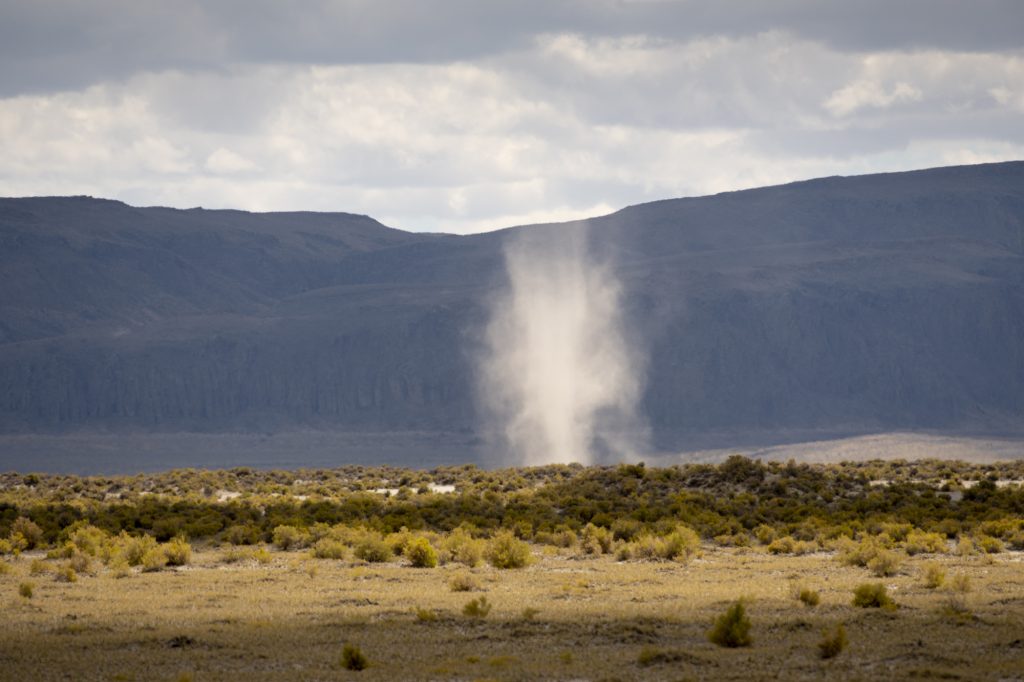Drones probe terrestrial dust devils to better understand the atmosphere of Mars
Dust devils, small dusty whirlwinds, have been studied for decades. But, says Brian Jackson, an associate professor in the Department of Physics at Boise State University, the ability of dust devils to lift dust into the atmosphere remains murky. “When we compare theoretical predictions of how much dust a devil should lift to how much it does lift, the numbers just don’t add up,” says Jackson,
Now, Jackson and his team, including Dr Ralph Lorenz of Johns Hopkins University’s Applied Physics Lab and Michelle Szurgot, an undergraduate physics major at Boise State, have begun to study the phenomenon in a way it has never been studied before. They fly drones through active dust devils on the Alvord Desert of southeastern Oregon. The drones carry cameras and other lightweight instruments, including pressure and temperature loggers, that measure the structures of the dust devil while taking particle samples to determine how much material the dust devil is carrying. Jackson will present results today at the EPSC-DPS Joint Meeting 2019 in Geneva, Switzerland.
Dust devils, while common in arid climates on Earth, are ubiquitous on Mars, where they may be responsible for much of the planet’s haze that helps heat its atmosphere. Dust devils have been observed from landers the ground and from orbiting spacecraft all over the surface of Mars. A better understanding of dust devils on Earth will help scientists understand their influence on Mars’ climate, says Jackson.
NASA currently has three active rovers on Mars, two of which are powered by solar panels. Martian dust has been a concern, falling on the panels and reducing the amount of energy generated, and the static charges that can build up in the dust devils may pose a hazard to electrical equipment deployed on Mars.
Previous studies of martian dust devils have relied on passive sampling of the profiles via meteorology packages on landed spacecraft. Past studies of terrestrial devils have employed more active sampling (instrumented vehicles or manned aircraft) but have been limited to near-surface or relatively high-altitude sampling.
Drones promise a new and powerful platform from which to sample dust devils at a variety of altitudes. Measurements made aloft are more directly relevant for evaluating the dust that is injected into the atmosphere.
In summer 2017, Jackson and his team were awarded a grant from the NASA Idaho Space Grant Consortium to launch drones into dust devils. In 2018, they also received a three-year, $217,000 grant from NASA’s Solar System Workings Program.
Image and video

https://www.europlanet-society.org/wp-content/uploads/2019/09/Dust_devil.jpg
Footage collected onboard the drone during flight:
Media Contacts
Anna Webb
Tel: +(208) 426-3275
annawebb@boisestate.edu
Anita Heward
EPSC Press Officer
+44 7756 034243
anita.heward@europlanet-eu.org
epsc-dps-press@europlanet-society.org
Livia Giacomini
EPSC Press Officer
epsc-dps-press@europlanet-society.org
Adriana Postiglione
EPSC Press Officer
epsc-dps-press@europlanet-society.org
Shantanu Naidu
DPS Press Officer
dpspress@aas.org
During the meeting, the EPSC-DPS Press Office can be contacted on +41 22 791 9617.
Further information
EPSC-DPS Joint Meeting 2019
The 2019 Joint Meeting (www.epsc-dps2019.eu) of the European Planetary Science Congress (EPSC) of the Europlanet Society and the Division for Planetary Sciences (DPS) of the American Astronomical Society (AAS) will take place at the Centre International de Conférences de Genève (CICG), Geneva, Switzerland, from Sunday 15 to Friday 20 September 2019. More than 1950 abstracts have been submitted and over 1500 planetary scientists from Europe, the US and around the world are expected to attend the meeting, making it one of the largest gatherings of planetary scientists held in Europe to date.
The EPSC-DPS Joint Meeting 2019 will be the third time that EPSC and the DPS Annual Meeting have been held together.
Follow: @europlanetmedia #EPSCDPS2019
Europlanet
The Europlanet Society, launched in September 2018, is an organization for individual and corporate members to promote the advancement of planetary science and related fields in Europe. The Society provides Europe’s planetary science community with a platform to exchange ideas and personnel, share research tools, data and facilities, define key science goals for the future, and engage stakeholders, policy makers and European citizens with planetary science. The Europlanet Society is the parent organisation of the European Planetary Science Congress (EPSC).
Europlanet Society website: www.europlanet-society.org
EPSC-DPSC 2019 Joint Meeting 2019 website: www.epsc-dps2019.eu
DPS
The Division for Planetary Sciences (DPS), founded in 1968, is the largest special-interest Division of the American Astronomical Society (AAS). Members of the DPS study the bodies of our own solar system, from planets and moons to comets and asteroids, and all other solar-system objects and processes. With the discovery that planets exist around other stars, the DPS has expanded its scope to include the study of extrasolar planetary systems as well.
The AAS, established in 1899, is the major organization of professional astronomers in North America. The membership (approx. 7,500) also includes physicists, mathematicians, geologists, engineers, and others whose research interests lie within the broad spectrum of subjects now comprising contemporary astronomy. The mission of the AAS is to enhance and share humanity’s scientific understanding of the universe, which it achieves through publishing, meeting organization, education and outreach, and training and professional development.
About Boise State University
A public metropolitan research university with more than 22,000 students, Boise State is proud to be powered by creativity and innovation. Located in Idaho’s capital city, the university has a growing research agenda and plays a crucial role in the region’s knowledge economy and famed quality of life. In the past 10 years, the university has quadrupled the number of doctoral degrees, doubled its masters degrees and now offers 13 online degree programs. Learn more at www.BoiseState.edu.

